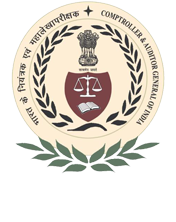Audit Reports

Nagaland
Report of 2011 - Performance Audit on Civil of Government of Nagaland
Overview
This Report contains 15 audit paragraphs (including three general paragraphs) and two performance reviews - 'Jawaharlal Nehru National Urban Renewal Mission Schemes in Nagaland' and 'Utilisation of declaration forms in Interstate Trade'. There is a separate chapter on Integrated Audit of the Public Works Department (Roads & Bridges). According to the existing arrangements, copies of the draft audit paragraphs and draft performance reviews were sent to the Secretary of the Department concerned by the Accountant General (Audit) with a request to furnish replies within six weeks. Replies were not received from the departments concerned in respect of two paragraphs.
Though the JNNURM guidelines provide for involvement of ULBs in the implementation, the activities under JNNURM had not been devolved to ULBs. The Department submitted the DPRs under BSUP and IHSDP projects without proper appraisal and approval of the SLNA and SLSC. The Department also did not conduct any survey to ensure availability of land and other resources before preparation of the DPRs. The State Government also did not release folly its share. As a result, the DPRs were revised, works relocated and items of works as per the DPRs were curtailed to the limit of available funds. Deficient contract management and lack of internal controls in the Department resulted in delays in award of contract, delay in execution of works, release of advance payments against rules and payment against unexecuted items of works. The prospect of successful implementation of JNNURM in the State of Nagaland is bleak as the Department had not identified the beneficiaries under BSUP and IHSDP and the dwelling units under construction were not constructed as per the approved specifications. Due to ineffective planning and inaction of the Department in taking remedial actions on the observations pointed out in the earlier audit report, there were instances of time overruns and cost overruns leading to non-achievement of the objectives of providing affordable housing facilities to the urban poor.
Planning process in the Department was inadequate as Long Term Plan State Action Plan or District Action Plans were not prepared resulting in lopsided planning and execution of projects. Financial Management was deficient as provision under salary head was inflated and utilised for payment of wages travelling allowance and maintenance of vehicles. DPRs/estimates for several major projects were not based on proper survey and investigation resulting in wide deviations in the scope and cost of the work on actual execution. Several works were not executed as per DPRs/Estimates and escalation/deviation was admitted without any basis. There were delays in transfer of funds to the executing divisions unauthorised deduction from scheme fonds at source and diversion of funds in violation of scheme guidelines. Provision of rules in realisation and deposit of government revenue were not followed in several divisions resulting in non/short realisation and non deposit/delays in deposit. Norms were not followed in the process of awarding works resulting in collusive bidding and allotment of work to bidders other than the lowest. Joint physical verification of selected projects revealed major shortcomings in execution. The existence of effective monitoring and evaluation of projects could not be established in the absence of records. Internal control was lax as several vital records were either not maintained properly as per norms or not maintained at all. Human Resource management was deficient as excess staff above sanctioned strength was retained. Over and above this, a large number of work charged employees were deployed. The existing system for transfer of funds to the divisions was not transparent and was vulnerable to fraud and corruption.
Download Audit Report
-
Report of 2011 - Full Report
 (34.22 MB)
Download
(34.22 MB)
Download
-
Preface of Report of 2011 - Performance Audit on Civil of Government of Nagaland
 (0.10 MB)
Download
(0.10 MB)
Download
-
Overview of Report of 2011 - Performance Audit on Civil of Government of Nagaland
 (0.71 MB)
Download
(0.71 MB)
Download
-
Chapter 1 of Report of 2011 - Performance Audit on Civil of Government of Nagaland
 (8.00 MB)
Download
(8.00 MB)
Download
-
Chapter 2 of Report of 2011 - Performance Audit on Civil of Government of Nagaland
 (2.61 MB)
Download
(2.61 MB)
Download
-
Chapter 3 of Report of 2011 - Performance Audit on Civil of Government of Nagaland
 (8.30 MB)
Download
(8.30 MB)
Download
-
Chapter 4 of Report of 2011 - Performance Audit on Civil of Government of Nagaland
 (4.16 MB)
Download
(4.16 MB)
Download
-
Chapter 5 of Report of 2011 - Performance Audit on Civil of Government of Nagaland
 (0.95 MB)
Download
(0.95 MB)
Download
-
Appendices of Report of 2011 - Performance Audit on Civil of Government of Nagaland
 (4.12 MB)
Download
(4.12 MB)
Download
-
Appendix of Report of 2010 - Performance Audit on Civil of Government of Nagaland
 (1.90 MB)
Download
(1.90 MB)
Download

